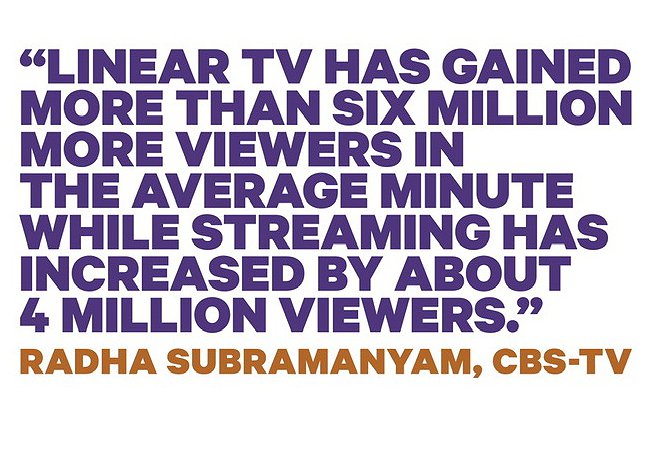Author|Radha Subramanyam
Source: www.mediavillage.com, May 2020
As the pandemic continues to upend lives and shake the foundations of our society, we are seeing consumer behaviors intensify and evolve. In this time of crisis and anxiety, television continues to be the great connecter, assuming an even bigger role in people’s lives by fulfilling deep human needs for comfort, knowledge and togetherness while mitigating uncertainty and fear.
We took a look at the impact of television in people’s lives by comparing current viewing patterns in the most recent weeks to the month or so prior to the COVID-19 outbreak. Here are some takeaways:
- TV is more popular than ever across a range of programming genres. It is not simply news viewing but much more. Usage levels are up dramatically compared to pre-pandemic and social-distancing directives. And the so called “ad-sales demographics” including A18-49 and A25-54 are flocking to television. Daytime is showing the greatest bump as more people are home during the day. But viewing growth is widespread across Primetime, Late Night, Daytime and Evening News.
- Viewership is seeing more growth in regions most impacted by the virus. In the past five weeks, drama, comedy and reality prime programs are attracting more A25-54 audiences from the Northeast, particularly in comedy.
- Primetime comedy is attracting more upscale viewers post pandemic as higher-income earners stay home and turn to light/funny programming to get through the crisis.
- Despite the headlines that say otherwise, growth is by no means simply for streaming. Linear TV has actually gained more than six million more viewers in the average minute compared to pre-pandemic levels while streaming has increased by about 4 million viewers. In other words, the demand for content across platforms is very strong.
- Co-viewing is accelerating as families are watching TV together. A25-54 are watching broadcast primetime alongside their kids and teens at a +21% higher rate than they had before the outbreak. Notably CBS’ rate of co-viewing has increased by +24%, more than any other broadcast network.
- Fun and familiar content is seeing the greatest gains during the pandemic. On a percentage basis, broadcast sitcoms have seen the largest gains among A25-54. Viewers seek a laugh, a familiar favorite show, say goodbye to a longtime series such as Modern Family and rally around the Cooper family on Young Sheldon, the most watched comedy on television.
- The need for familiarity and escapism was evident in the 20 broadcast programs showing most growth among A25-54s during the pandemic. Gains were seen in series finales of longtime fan favorites, Hawaii Five-0 and Modern Family, as well as established popular dramas NCIS, Blue Bloods, Grey’s Anatomy and This Is Us. Even more recent fan favorites FBI, FBI: Most Wanted, The Good Doctor, and New Amsterdam increased audience as did lighthearted shows such as The Masked Singer, Ellen’s Game of Games, Mom, Bob Hearts Abishola, and Superstore.
- Cable primetime increases are driven by cable news, however lifestyle networks also made gains led by Food Network, as more people are cooking at home.
- Music-themed specials are also popular, offering cathartic family entertainment. One World: Together at Home (delivered nearly 21m viewers, more than any Saturday show other than NFL playoffs), Disney Family Singalong (10m+ viewers), Grammy Salute to Prince (highest A18-49 Grammy Salute delivery in three years), and others provide direct help in some cases and lift spirits in all cases.
- Evening News is having a renaissance, with all major newscasts seeing large scale increases. In addition to Medical and Economic updates, trusted experts like Dr. Fauci are generating a great deal of attention and interest.
CBS Continues to Lead
The role CBS plays in American lives during times of crisis is built on years of leadership as America’s most-watched television network and can be seen in our recent performance where viewers are increasingly turning to CBS to stay both informed and entertained.
- In overall performance, CBS will finish the 2019-2020 season as America’s most-watched network for the 12th consecutive year, outperforming our closest competitor by nearly 1 million viewers. We not only rule in Primetime (for the 12th consecutive season), we also lead in Late Night (3rd consecutive) and Daytime (34th consecutive).
- In Primetime, CBS boasts three of the top 5 programs with the largest viewer growth since the start of “stay at home” orders, seven of the eight top new series and the season’s most-watched primetime Comedy, Drama and News program. Our Primetime originals are up significantly more than the average of the competition.
- Daytime is also growing. Our regularly scheduled programming gained double-digits with record-setting audience deliveries with larger growth than all competitors during this crisis.
- In News, CBS’ legacy and leadership is shining through. The legendary 60 Minutes ranks #1 among all Primetime programs for three of the last seven weeks and among the top five every week. Further, every CBS News series across the programming day has grown significantly since the crisis. Face the Nation had its best week in 28 years. Sunday Morning posted its best viewer average since 1994. CBS Evening News had its most-watched week in more than three years. Notably, our news gains are cross platform. CBS News video viewership is increasing dramatically on social platforms
Conclusion
We know that TV plays an outsized role during any time of crisis. But its ability to bring comfort, knowledge and togetherness is especially evident today. Since the pandemic outbreak and the subsequent “shelter-in-place” policies, people are turning to TV in larger numbers and across all dayparts. And more viewers are turning to CBS – America’s largest and unashamedly “big tent” network – than anywhere else.

